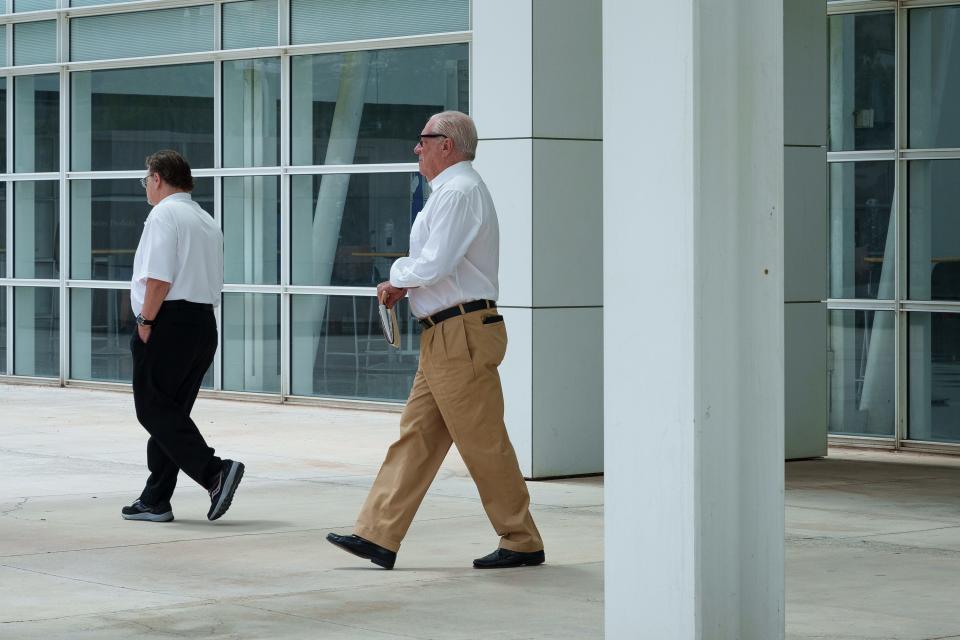Prosecutors wrap up arguments against Backpage executives as trial nears end in Phoenix
After five weeks, the trial of Backpage.com executives in Phoenix is nearly over.
On Friday, federal prosecutors finished their closing arguments against leaders of the defunct classified ad site, and the defendants' final arguments got underway.
This is the second trial against the Backpage executives, including Michael Lacey, the former longtime editor and founder of the Phoenix alternative weekly, New Times. Lacey faces several counts alleging he facilitated prostitution. He also faces several counts alleging money laundering. The first trial ended in a mistrial.
Lacey's longtime newspaper publishing partner, James Larkin, died by suicide July 31, days before the start of the trial.
Assistant U.S. Attorney Kevin Rapp reminded jurors of what the government needed to show for the defendants to be found guilty of conspiring to violate the Travel Act, a federal criminal law prohibiting interstate or foreign commerce from distributing the proceeds of an unlawful activity.
Rapp defined the parameters of conspiracy for the jury. There needed to be an agreement between two or more people to commit violations of the Travel Act, defendants must have become members of the conspiracy knowing at least one of its objectives, and one member of the conspiracy must have performed at least one overt act, like laundering money, Rapp said.
"The defendants are guilty of a conspiracy," Rapp said.
The defendants did not have to join the conspiracy at the same time or make a formal agreement, and individual members did not have to know every single detail of the conspiracy, he said.
Rapp refreshed the jurors' memories on several exhibits, including posts from the Backpage website that contained language and pictures that were "indicative of prostitution."The posts featured images of nearly nude women in lingerie and referred to services that cost "50 roses," which Rapp said were sex services sold for $50.
"Each of these postings are the furtherance of a conspiracy," Rapp said.

Many of the posts contained phrases like "new in town" and "girlfriend experience," which Rapp said was indicative of prostitution.
Rapp reminded the jurors that several of the women featured in the ads had testified they and their pimps knowingly used the website to facilitate prostitution.
Emails showed that the defendants knew certain words and phrases were indicative of prostitution, Rapp said. The defendants stripped those words and phrases from postings and republished them, he said.
"This is a smoking gun," Rapp said of one such email projected on screens in the courtroom. "This demonstrates that they know these ads are for prostitution."
"So what did they do with all the money?" Rapp asked the jurors of the hundreds of millions of dollars generated by Backpage.
The state then showed the jury a flow chart illustrating what Rapp called a "web of concealment." Rapp said it showed shell companies that Lacey and others used to launder Backpage money. Rapp said money flowed all over the world, through the Netherlands and Hungary, and ended up back in the Arizona bank accounts of the defendants.
Rapp told the jury that banks and credit processing companies had refused to do business directly with Backpage, so they were forced to create shell companies and accept payments in cash, money orders, Visa cash cards known as "Vanilla Visas," and the cryptocurrency bitcoin.
"It's dirty money from Backpage," Rapp told the jury.
"The defense does not have a right to run an institution that facilitates prostitution because prostitution is illegal," Rapp said as he finished up closing arguments for the government.
Tainted testimony cited: Federal judge declares mistrial for Backpage executives accused of facilitating prostitution
While Rapp took a step-by-step approach to summarizing the government's claims against the defendants, Lacey's attorney, Paul Cambria, took a more holistic approach to disputing the allegations.
He began by thanking the jury members for their service, which has gone on for two months, telling them they have "the last word."
"Mr. Lacey relied on good faith" that former Backpage CEO Carl Ferrer, who is a witness for the government, operated the business legally, Cambria said.
Cambria showed the jury a picture of a commendation from the former head of the FBI, Robert Mueller, awarded to Ferrer for helping the law enforcement agency.
"They weren't furthering prostitution; they were helping to prosecute it," Cambria said of the defendants' record of working with law enforcement.
Cambria took issue with the government calling attention to the large sums of money made by the company.
"Yes, there were large numbers," Cambria said, noting there is nothing illegal about being profitable.
Cambria said there was no proof that his client had ever seen the ads highlighted by the government.
He instead portrayed Lacey as an "old newspaper guy" who was wholly concerned with running the news sites and publications owned by the company. Cambria said Lacey could potentially be called a "dinosaur" who was not well versed in the internet-based business run by Ferrer.
Cambria told the jury that Ferrer and others took plea deals because they had "prison bars ringing in their ears" and had an incentive to testify against Lacey and the co-defendants.
"Justice will be done if my client is acquitted," Cambria said of Lacey.
Attorneys for Lacey's co-defendants will resume closing arguments on Tuesday morning.
'They were prostitution ads': Backpage founder testifies website was used to sell sex
Have a news tip? Reach the reporter at jjenkins@arizonarepublic.com or 812-243-5582. Follow him on X, formerly known as Twitter: @JimmyJenkins.
This article originally appeared on Arizona Republic: Prosecutors wrap up arguments as Backpage trial nears end in Phoenix

